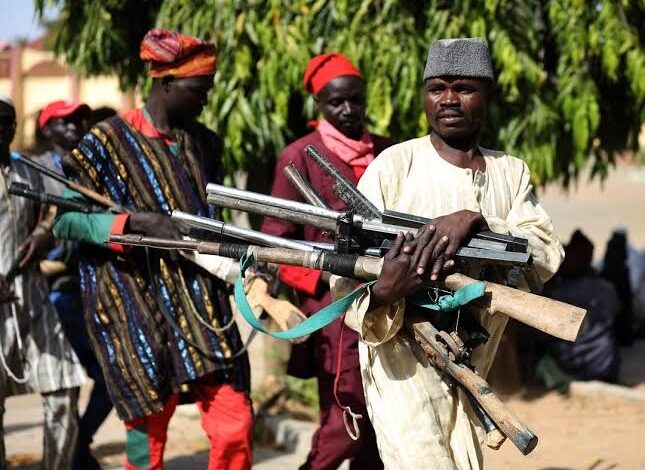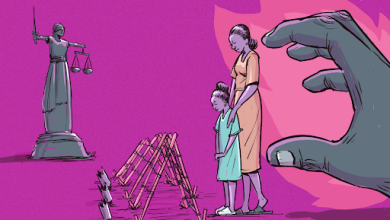Arming Civilians In Nigeria’s Zamfara State ‘Is Suicidal’
The state government intends to provide arms to civilians to enable them fight terrorists. We have seen this strategy of setting up militias fail and aggravate violence in the northwestern part of the country and in another African country.

Reactions to the Zamfara state government’s directive to residents to prepare for self-defence against terrorists by possessing guns have continued to surface even as the state’s commissioner of police reiterated that the ban on firearms remains in effect.
While some residents who spoke to HumAngle supported self-defence through community actions, they worried that granting gun licences to everyone would lead to anarchy as seen in countries suffering from gun violence.
Initially, in a special announcement made by the state government’s Commissioner for Information, Ibrahim Magaji Dosara, the authorities stated that the gun licence directive was necessary due to the constant attacks by terrorists.
“Following increase in the activities of bandits in various parts of the state and the government’s commitment to ensure adequate security and protection of lives and property of the citizenry in the state, particularly during this rainy season, government has resolved to take further measures to deal with the recent escalating attacks, kidnapping and the criminal levies being enforced on our innocent communities,” Dosara said.
The state government intends to support 500 people in each of the 19 Emirates, smaller lands under the control of a traditional leader across the state, in obtaining firearms for self and community defence.
However, in response to the directive, the Commissioner of Police in the Zamfara Command, Ayuba Elkana, stated that the restriction on firearms was still in effect, adding that the Police has stopped issuing licences for gun ownership.
Section three of the Firearms Act states that no one in Nigeria has the right to possess firearms such as guns unless a licence is granted by the President acting in his discretion or through the Inspector General of Police.
“No person shall have in his possession or under his control any firearm or ammunition except in accordance with a license granted by the President acting in his discretion,” the section states.
But even before the government’s latest directive, members of the local self defence group known as the Yan Sakai, which operate in Zamfara and other Northwestern states are in possession of firearms especially those produced by local blacksmiths.
In Sokoto, a state neighbouring Zamfara where insecurity is also taking a toll on its people, an investigation by HumAngle revealed that residents buy locally made guns for as little as ₦3,500.
“We realised they were attacking us because we were not standing up to them. This made us start night patrols and it involved all the members of our community” Labaran Tela was quoted to have said in the report.
“It is suicidal”
In previous reports, HumAngle has shown how terrorists launch attacks against communities using lethal weapons including assault rifles.
According to residents, responding to the terrorists in possession of such calibre of arms by untrained people will be suicidal even if they possess weapons.
Junaidu Badarawa, who is a local farmer in Shinkafi, an area struggling with incessant attacks, says responding to the directive will lead to a deadlier situation.
“Residents in our village are tired of fighting terrorists with local weapons. Because the more we carry weapons in defence of our communities, the more dangerous [the situation] becomes,” he said.
According to Musab Mafara, an academic, despite the fact that people are encouraged to defend themselves against anyone in any way they can, the new move will not solve the state’s insecurity problem.
“First and foremost, I do not believe that any non-security personnel will be permitted to possess machine guns such as the AK-47, which terrorists occasionally use. Even if it is permitted, it will only be a pump-action rifle, which is incompatible with the machine gun,” he explained.
“Second,” Mafara continued, “how many farmers have the means to buy guns after being made poor by terrorists through kidnapping and cattle rustling?”
Bello Galadi, a lawyer based in the state capital, Gusau, explained that the estimated price of an AK-47 is close to one million naira, and an ordinary citizen battling to feed himself and a family may not have the financial capacity to own a gun.
“It is suicidal on the part of your government to proceed with this security arrangement that will allow citizens to own guns. It will lead to a state of anarchy and war,” he said, directing his message to the state governor, Bello Matawalle.
Abdulrahman Mafara, a shop owner in Talata-Mafara, shared a similar view with Galadi. As far as he is concerned, a villager can’t afford to buy a gun while facing extortions and attacks from the terrorists.
Yusuf Anka, a security expert based in Zamfara, wades into the discourse. He pointed out that, if implemented, the directive will likely lead to more chaos and set the stage for more tribal and communal clashes which will result in more retaliations.
“One of the effects of 500 arms in each Zamfara emirate will lead to an unprecedented attack on all Fulani individuals and settlements. Many may have to leave the state. Then reprisals,” he wrote.
In many Zamfara communities attacked by terrorists, reprisals were recorded whenever the terrorists were met with force, especially if some of them were killed.
The local Yan Sakai, vigilante group are accused of profiling and attacking individuals of Fulani ethnic background because of the ethnic affiliation of the terror groups responsible for the attacks on communities. This extrajudicial violence has contributed to the crisis.
The growth of self defence groups has also become a sub regional problem, as countries battle communal conflicts and activities of Al Qeada and Islamic state affiliated groups.
In Burkina Faso, the country’s parliament unanimously voted in February 2020 to arm civilians and train them to support the military in offensive operations against terrorists operating in the country.
However a few months later in May 2020, Amnesty International accused the vigilante groups of escalating the violence by attacking three Fulani communities of Dinguila-Peulh, Barga, and Ramadolla-Peulh, and massacring over 40 people they accused of supporting the terrorists.
What is the way out?
Several people who have commented on the new directive have suggested that Zamfara State empowers the Civilian Joint Task Force (CJTF), which will work alongside Nigerian security forces to respond to the threat of insecurity in the state.
“Through the civilian JTF, terrorists can be tracked anywhere. The civilians are important because they know where the terrorists hide, and the security forces know how to use weapons,” said Balarabe Abdullahi, a public commentator in Northern Nigeria.
“Providing arms to organised militias or civilians would create more security risks and vulnerability. It would also simply mean relinquishing to civilians, the government’s responsibility particularly the task of protection and policing of communities,” says Murtala Abdullahi, HumAngle’ head of Armed Violence desk.
He adds that the country is already suffering from growing proliferation of weapons and armed groups. Which is contributing to increasing insecurity. “Moreover, arming civilians or establishing state backed militias is not a substitute for badly needed investment in building up policing capacity”.
Support Our Journalism
There are millions of ordinary people affected by conflict in Africa whose stories are missing in the mainstream media. HumAngle is determined to tell those challenging and under-reported stories, hoping that the people impacted by these conflicts will find the safety and security they deserve.
To ensure that we continue to provide public service coverage, we have a small favour to ask you. We want you to be part of our journalistic endeavour by contributing a token to us.
Your donation will further promote a robust, free, and independent media.
Donate HereStay Closer To The Stories That Matter




